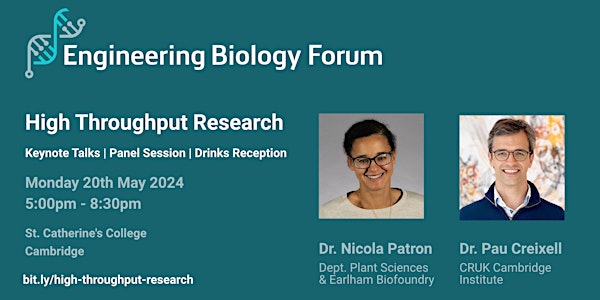
EngBio Forum Easter 2024: High Throughput Research
How can high throughput techniques and research automation benefit biological research?Keynote lectures, discussion and networking
Date and time
Location
St Catharine's College
Trumpington Street Cambridge CB2 1RL United KingdomAgenda
4:45 PM - 5:00 PM
Registration
5:00 PM - 5:15 PM
Introduction
5:15 PM - 6:00 PM
Synthetic Expansions of Plant Metabolism

Dr Nicola Patron
6:00 PM - 6:45 PM
Elucidating protein function using high-throughput biochemical technologies

Dr. Pau Creixell
6:45 PM - 7:00 PM
Panel Discussion
7:00 PM - 8:30 PM
Exhibition, networking, drinks reception & canapés
About this event
- 3 hours 30 minutes
The Engineering Biology Forums are a series of talks exploring key tools for the future of engineering biology and biotechnology. Hosted by the Engineering Biology Interdisciplinary Research Centre at the University of Cambridge, the forums will take place 5pm-8.30pm at the McGrath Centre, St Catharine's College Cambridge. Keynote lectures and discussion session will be followed by food, drinks and networking.
Dr Nicola Patron
Associate Professor, Department of Plant Sciences, University of Cambridge and Group Leader, Earlham Institute
Synthetic Expansions of Plant Metabolism
In the past decade, synthetic biology has accelerated methods for reconstructing the biosynthetic pathways of high-value natural products in so-called ‘chassis’ organisms. In our lab, we integrate genomics, metabolomics, and bioactivity assays to identify molecules responsible for the bioactivity of plant extracts and to investigate the genetic basis of natural products. This enables us to understand mechanisms of metabolic diversification and explore methods for biomanufacturing. We also develop plants as photosynthetic biomanufacturing platforms, engineering synthetic circuits and tailoring plant genomes to optimise yield.
Biography
Nicola Patron is a plant molecular and synthetic biologist interested in using engineering approaches to understand biological complexity and advance plant biotechnology. The research in her lab is focused on understanding how quantitative plant phenotypes emerge from network functions and exploring and utilising metabolic diversity. She completed a PhD in plant molecular biology followed by post-doctoral research on plastid metabolism at the John Innes Centre and the University of British Columbia. As a ‘SynBioLEAP’ fellow, she was recognized as an emerging leader in synthetic biology. She started her lab at the Earlham Institute in 2016 and was also the Director of the Earlham Biofoundry, developing it as a resource for the UK’s biology and biotechnology communities to undertake large-scale projects. In 2023, she co-founded ‘Black in Plant Science’, a network to connect, celebrate, and cultivate UK-based Black plant scientists.
Dr. Pau Creixell
Group Leader, Cancer Research UK Cambridge Institute, University of Cambridge
Elucidating protein function using high-throughput biochemical technologies
In this talk I will describe our laboratory’s efforts to elucidate the function of protein tyrosine kinases using high-throughput biochemistry. If time allows, I may also briefly describe alternative screening technologies that we are developing and how they enable us to address new research questions within evolution, drug design and the potential enhancement of a variety of biochemical reactions.
Biography
Pau studied Human Biology at the Universitat Pompeu Fabra, Barcelona, before moving to Oxford, London and the Technical University of Denmark where he obtained his PhD in Computational Biology. He then received a postdoctoral fellowship from the Helen Hay Whitney Foundation to pursue his postdoctoral studies at the Koch Institute for Integrative Cancer Research at MIT. After securing a K99/R00 Pathway to Independence award from NIH/NCI, he established his lab at the University of Cambridge – CRUK Cambridge Institute in 2020. His lab integrates machine learning and high-throughput biochemistry to study how proteins selectively recognize their substrates, how this process is perturbed in cancer and how it can be hijacked to find highly selective and mutant-specific drugs to overcome drug resistance.
Tickets
General Admission' tickets include admission to the keynote talks, followed by the networking and reception. The reception will offer food and drink, along with a chance to meet with the speakers, network and chat with colleagues.
Keynote talks will be in person. A copy of the presentations may be available after the event (tbc).
Contact
coordinator@engbio.cam.ac.uk